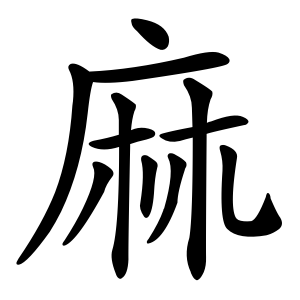麻
- hemp;
- jute;
- flax;
It specifically referring to Cannabis sativa, an annual plant of the hemp family.
Etymology
The character 麻 is a compound ideogram, formed from:
𣏟 (p’ae, pictograph of hemp stalks or fibers)
广 (eom, "house" or "shelter")
Together, they depict the process of stripping hemp inside a house.
Usage in Korean
Since ancient times, hemp has been closely associated with human life.
Its seeds have been used for food and medicine.
Its fibers, taken from the stalk, are used to make hemp cloth.
Thus, 麻 can also refer to hemp cloth.
When used as a radical, it typically refers to hemp-related meanings.
Additionally, 麻 is used as a phonetic component in many characters with the reading ma, such as:
魔 (마귀 마, demon)
磨 (갈 마, to grind)
摩 (문지를 마, to rub)
Similar shape characters
Characters with 麻
15 strokes
Words that derived from 麻
麻
삼
마
sam
ma
Kangxi radical:200
Strokes:11
Unicode:U+9EBB
Cangjie input:
- 戈木木 (IDD)
- 戈十金金 (IJCC)
Composition:
- ⿸ 广 林 (G J V)
- ⿸ 广 𣏟 (H T K)
